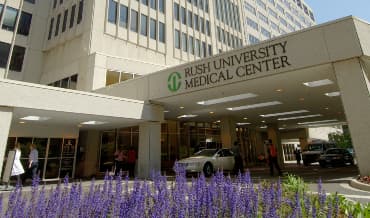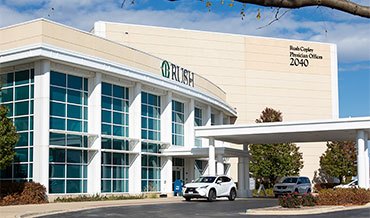Early diagnosis and proper treatment to control seizures can help prevent long-term physical, emotional and social problems associated with epilepsy.
Remarkable Care for Kids
- Clinical expertise: The Rush Epilepsy Center focuses on selecting the best medication regimen for each child with epilepsy. Through clinical trials, epilepsy experts at Rush also participate in the study of new medical treatments that are not otherwise widely available. The center also earned level 4 Epilepsy Center designation (the highest possibly designation) by the National Association of Epilepsy Centers.
- Comprehensive care: The Rush pediatric epilepsy team focuses on helping children with epilepsy thrive and reach their fullest potential cognitively, emotionally and socially. They work with families and schools to help children with epilepsy succeed despite their challenges.
- Remote seizure monitoring: Rush’s epilepsy program, in collaboration with the Epilepsy Foundation of North/Central Illinois, is developing portable communication technologies that will allow epileptologists to take specialized epilepsy care to children with refractory epilepsy in rural communities that lack this expertise. This can help avoid taking your child to the emergency department.
- Family-centered care: Rush University Children’s Hospital is committed to family-centered care. Your child’s doctors will involve you in all aspects of your child’s epilepsy care.
- Social, emotional and educational support: Child Life specialists at Rush offer children age-appropriate activities and education to help them cope with having epilepsy, while also preparing them for medical tests, procedures and surgery.
- Quality care: The Rush EEG lab is one of the most experienced in the region. The lab is accredited by the American Board of Registration of Electroencephalographic and Evoked Potential Technologists. This means the lab has met rigorous technical, personnel and safety standards.
What is epilepsy?
Epilepsy is a brain disorder in which clusters of nerve cells (known as neurons) sometimes signal abnormally, often causing recurring seizures. Epilepsy can begin at any age in childhood and often remains active for several years. It usually requires treatment with medications.
If your child has a seizure, it does not necessarily mean he or she has epilepsy. In fact, your child must have had two or more seizures that cannot be attributed to another cause to be diagnosed with epilepsy.
Other causes of seizures can include the following:
- Fever
- Head trauma
- Illness or infection
- Electrolyte imbalance (e.g., abnormally high or low glucose levels)
- Bleeding or swelling in the brain
Types of epilepsy in children
There are many types of epilepsy in children. Some of these include the following:
- Benign rolandic epilepsy is the most common cause of seizures in healthy school-aged children. Seizures usually begin in elementary or middle school. A typical seizure consists of twitching, numbness or tingling in the face or tongue, leading to drooling and problems with speech. The seizures often occur at bedtime.
- Epileptic encephalopathies are a group of disorders that include a child with the following:
- Seizures
- Significant learning delays, often with a loss of developmental skills
- Abnormal EEG pattern
- Genetic epilepsy refers to a number of seizure disorders (e.g., Dravet syndrome) caused by genetic problems. The seizures often start in infancy or early childhood. Children may have several types of seizures and the seizures can be challenging to control. Children with this type of epilepsy may have a family history of epilepsy.
- Juvenile myoclonic epilepsy includes seizures that begin during the teenage years. The seizures are quick jerks of the arms, shoulders or occasionally legs — and are sometimes followed by tonic clonic seizures or whole body convulsions.
- Pyridoxine-dependent epilepsy is caused by a specific genetic problem and starts when a child is a newborn or baby. It can usually be treated with doses of pyridoxine (vitamin B6) or related compounds.
- Intractable epilepsy refers to recurrent seizures that are not well controlled with medication. With this type of epilepsy children have typically been on at least two different medications at appropriate doses. This can become a chronic condition lasting into adulthood. In addition to recurring seizures, children with intractable epilepsy often have learning and behavioral difficulties. Because seizures are not controlled with medications, other treatment options include epilepsy surgery, ketogenic diet or vagus nerve stimulation maybe used.
Types of seizures in children
There are also several types of seizures — which occur in different regions of the brain — that occur in children.
- Absence seizures are brief staring spells with impaired awareness, lasting a few seconds and occurring multiple times a day. They are most common in preschool and young school-aged children.
- Generalized tonic clonic seizures cause stiffening, then jerking of the muscles with a loss of consciousness. These seizures may require emergency care.
- Infantile spasms are seizures that almost always begin in the first year of life. The seizures often look like a startle with a baby’s arms extending, a head drop or body arching. They often happen many times a day, especially around sleep-wake transition. Infantile spasms can be harmful to baby’s development and should be treated promptly.
Epilepsy: what you should know
- About two-thirds of kids with epilepsy outgrow their seizures by adolescence.
- Some epileptic seizures may cause learning and attention problems and social or developmental delays.
Causes of epilepsy in children
Although the majority of epilepsy in children does not have an obvious cause, some types of epilepsy can be attributed to the following:
- Brain injury
- Brain tumor
- Genetic or chromosomal disorders
- Metabolic disorders
How can my child get help for epilepsy?
- If your child has had one or more seizures, call your pediatrician. Your pediatrician may refer you to an epilepsy specialist at Rush to obtain an accurate diagnosis, pinpoint the source of seizures and advise the most appropriate treatment.
- For diagnosis, your child’s epilepsy specialist may recommend tests to measure electrical activity in your child’s brain, evaluate how the brain functions and study the brain’s structure. These tests may include some of the following:
- Electroencephalogram (EEG) or a video EEG (VEEG)
- Magnetic resonance imaging (MRI)
- Diffusion tensor imaging (a type of specialized MRI)
- Single photon emission computed tomography (SPECT)
- Children with intractable epilepsy may benefit from a second opinion from an experienced epileptologist (a neurologist who specializes in epilepsy), like those at the Rush Epilepsy Center. Sometimes children may have a wrong initial diagnosis. In other cases, an epileptologist may recommend a more effective medication or surgical option to help decrease your child’s seizures.
Epilepsy Care at Rush

Care for pediatric epilepsy at Rush
Pinpointing seizure location: Epilepsy experts at Rush use SISCOM imaging technology. This technology helps doctors identify the origin of seizures in children’s brains with greater accuracy. Rush is one of only a handful of centers in Illinois with SISCOM.
Controlling seizures: Between 70 to 80 percent of children who have epilepsy achieve full seizure control through medical treatment:
- Medications: Pediatric epilepsy specialists at Rush focus on selecting the best regimen of seizure medications for each child. The goal of treatment is to stop seizures completely, while also focusing on your child’s quality of life.
- Other interventions: Pediatric epilepsy specialists at Rush also use other interventions — including immune therapy and large doses of vitamin B6 — for specific types of epilepsy, such as epileptic encephalopathies and pyridoxine-dependent epilepsy.
- Dietary treatments: Dietitians at Rush are available to counsel your child and your family on controlling epilepsy with the ketogenic diet and low glycemic diet. The ketogenic diet is a special high-fat, low-carbohydrate diet that your child’s epileptologist may advise if your child has epilepsy that is difficult to control.
Other options for intractable epilepsy: If your child’s epilepsy is not controlled by medicine or diet, pediatric epilepsy specialists at Rush can offer a number of other options:
- Vagus nerve stimulation: Pediatric neurosurgeons at Rush implant a device that prevents seizures by sending mild pulses of electrical energy to the brain by way of the vagus nerve in the neck. The epilepsy team at Rush is widely experienced in using vagus nerve stimulation in children.
- Telehealth access to epilepsy specialists: Rush’s epilepsy program, in collaboration with the Epilepsy Foundation of North/Central Illinois, is developing portable communication technologies that will allow epileptologists to take specialized epilepsy care to children with refractory epilepsy in rural communities that lack this expertise. This can help avoid taking your child to the emergency department. This technology includes the following
- Micro-EEGs that can be put on a child’s head within minutes and relay information remotely
- Biosensors that can be placed on the body to watch children walk around in their own homes in case of falls.
- Implantable nanotechnology: Rush’s epilepsy program is also developing implantable nanotechnology, which is the size of a pin tip. Currently in pre-clinical stages, this patented technology can be injected into the brain to help sense early seizure activity. This technology can help improve stimulation therapy that is combined with medications to stabilize otherwise uncontrolled seizures.
Emotional support: Having seizures – whether they are controlled or uncontrolled – can be frightening for you and your child. The Rush Epilepsy Center team provides counseling and support for children living with epilepsy and their families.
Educational support: Children with epilepsy often have learning and behavioral difficulties. Pediatric epilepsy specialists at Rush help families advocate for their children in the school setting to obtain the necessary educational support. They also work closely with pediatric psychologists and psychiatrists at Rush to help children with epilepsy.
In addition to experienced epileptologists, the team includes the following:
- Social workers
- Neuropsychologists
- Clinical pharmacists
- Dietitians
- Nurse practitioners
- Pediatric neurosurgeons



